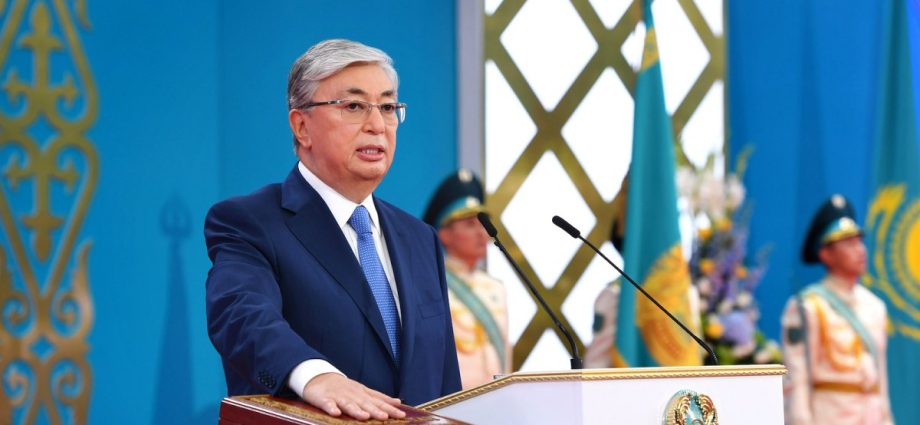
A new conflict is appearing in Central Asia that puts Kazakhstan under pressure from Kyrgyzstan, which has in effect been engaging in a strategic partnership with Russia since 1991.
Ever since Russia launched its war of aggression against Ukraine in February 2022, this collaboration has deepened in one particular respect, involving attempts to circumvent the sanctions imposed on Moscow.
It has recently become known that the US will announce new sanctions against both Kyrgyzstan and Kazakhstan in an attempt to halt the trade of dual-use technology to Russia.
In a development that could affect the region’s power dynamics, Bishkek appears to be using Kazakhstan’s dependence on Kyrgyzstan for water resources to coerce it to participate in this scheme.
Bad actors in Kyrgyzstan purchase dual-use goods from China, Europe and elsewhere, seeking to smuggle them to Russia to make money. A clandestine corridor has been established, passing through Kyrgyzstan and Uzbekistan, across Turkmenistan, and finally across the Caspian Sea before reaching Russia.
The existence of this roundabout network of illicit trade testifies to the lengths to which these international actors are willing to go to abet Russia’s attempts to bypass the sanctions.
Of course, a more direct and seemingly obvious route exists through Kazakhstan. Until now, Kazakh authorities have resisted the establishment of such a route.
Official Astana does not want the country’s economy to suffer from the imposition of secondary sanctions, especially at the current crucial juncture in President Kassym-Jomart Tokayev’s implementation of his comprehensive reform plan for the country.
However, Kazakhstan’s official policy has not always deterred the smugglers who operate in the shadows, persistently trying to make this more direct route functional.
Water politics
Now come reports of mounting pressure from Kyrgyzstan on Kazakhstan. One would think that smaller Kyrgyzstan would have no leverage over larger Kazakhstan. However, Kazakhstan depends on the Chu and Talas Rivers for water, and both these waterways originate in Kyrgyzstan.
Moreover, the operation and maintenance of the dams and reservoirs that regulate the flow of these rivers are also under Kyrgyzstan’s control. This gives Kyrgyzstan significant potential leverage over Kazakhstan.
Indeed, Kyrgyzstan has not shied away from using this leverage in the past. In 2005, Kyrgyzstan cut off water to Kazakhstan during a political crisis in the latter. This led to protests from Kazakhstan that ultimately compelled Kyrgyzstan’s government to restore the water flow.
More recently, in 2018, Kyrgyzstan threatened to cut off water to Kazakhstan if the two countries could not reach an agreement on the management of the Chu River.
Just last year, Bishkek once more threatened to cut off water to Kazakhstan, this time citing a water shortage in Kyrgyzstan.
These threats have caused serious concern in Kazakhstan, leading to negotiations between the parties in the attempt to resolve the issue.
Regional cooperation over water resources in Central Asia remains, as it has been since 1991, a mosaic of temporary arrangements aimed at short-term loss prevention. Different conflicts have periodically flared up, only to be extinguished and then papered over.
A long-standing conflict between Kyrgyzstan and Uzbekistan over water resources has mostly moderated since the death of former Uzbek president Islam Karimov, as the two countries’ relations have significantly improved in general.
The origin of that conflict was in Kyrgyzstan’s chronic failure to pay Uzbekistan for gas supplies. Uzbekistan’s main natural-gas export pipeline to other countries in Central Asia runs from Tashkent through Bishkek to Almaty via northern Kyrgyzstan and southern Kazakhstan.
Kyrgyzstan had contracts for off-taking some of these supplies along the way. However, its failure to pay for them frequently led Uzbekistan to halt these exports, especially during the cold winter months. Kyrgyzstan would then respond by periodically withholding water and hydroelectric power from Uzbekistan, especially during the summer growing season.
A decade and a half ago, at the time of these continuing disagreements between Uzbekistan and Kyrgyzstan, military clashes were reported between Uzbekistan and Turkmenistan over the physical control of water installations.
At roughly the same time, conflict erupted between Uzbekistan and Tajikistan over the latter’s decision to construct the Rogun hydropower station.
Expert assessments at the time raised the possibility that this would lead to a decline in water levels and water quality in Uzbekistan and other downstream countries.
Central Asia is a generally arid region, and Kazakhstan’s hydrographic network is sparse. Water is used not only for direct human consumption but also to raise fish for human consumption. A diverse fisheries sector developed during the Soviet era, centered on the Volga-Caspian basin and closely managed by Moscow.
The political and administrative shock from the disintegration of the Soviet Union in 1991 was catastrophic for Kazakhstan’s wild-fish harvests and aquaculture. Despite new favorable policy steps, managing the country’s water resources and fisheries sector is still problematic.
In the newly unfolding situation, Kyrgyzstan is using its control of water resources to try to compel Kazakhstan to participate in breaking sanctions against Russia. Kazakhstan’s territory simply offers an easier route than the existing one passing through southern Central Asia and across the Caspian Sea. Kazakhstan is generally resisting this pressure.
At the same time, the whole issue of water policy remains a vulnerability for Tokayev’s implementation of his reform program. Kazakhstan has confirmed itself as a stable and strong “middle power” under Tokayev’s leadership, and it is most likely that the country can handle the pressure.
Water shortages, however, make life difficult for both the population and the leadership. They are chronic, not only for Kazakhstan but for much of Central Asia, and this problem has until now resisted any longer-term solution.

